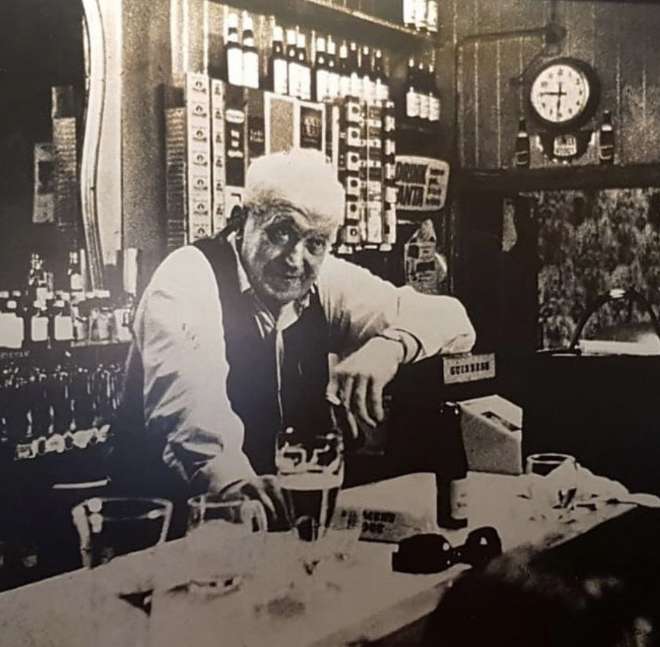About
The historic Dropping Well Pub is located on the banks of the river Dodder in Milltown, Dublin 6. The Dropping Well has been extensively refurbished to incorporate a range of dining and function room areas, and to make the most of the panoramic views of the Dodder. We have lots of High Definition LCD TV screens so come and join us to cheer on your favourite team, horse or master golfer in great comfort with incomparable atmosphere!
At the front of the pub, Boxer Maher’s public bar offers old-fashioned drinking surroundings with wood and bric-a-brac recreating the style of a Victorian watering hole. Our well loved bar has a roaring fire for those cold winter evenings, all the biggest sporting occasions are shown on our HD TV’s and we have fantastic traditional music sessions every other weekend!
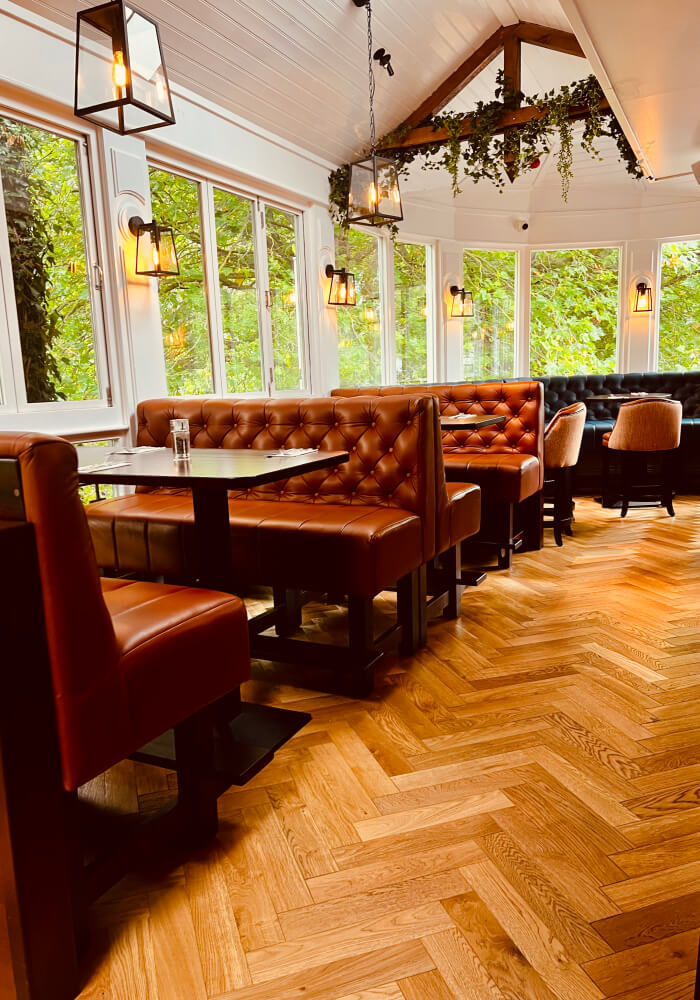
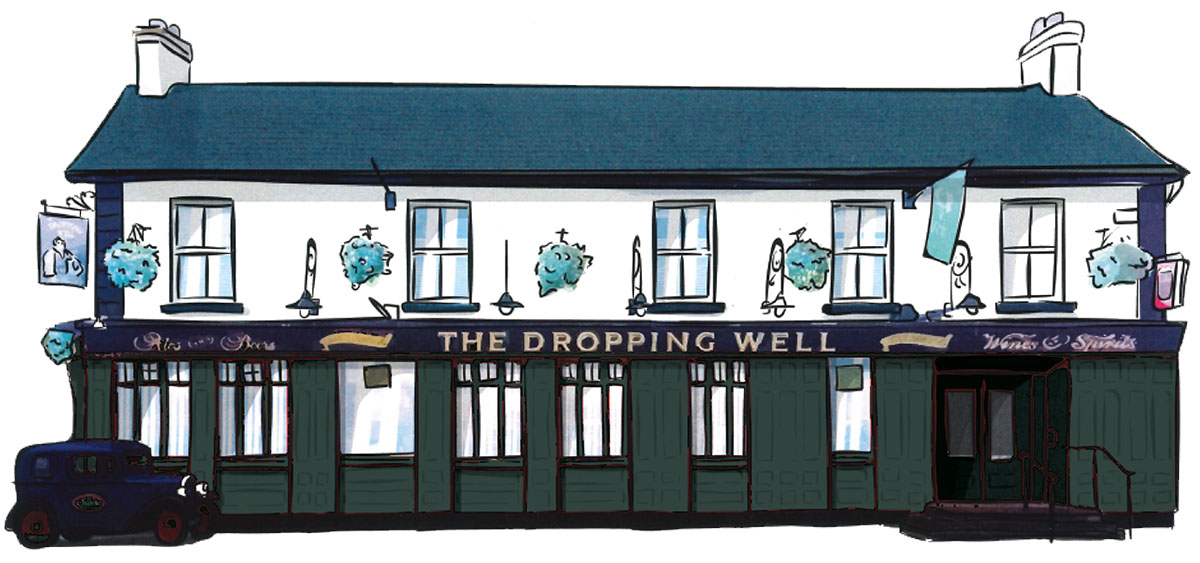
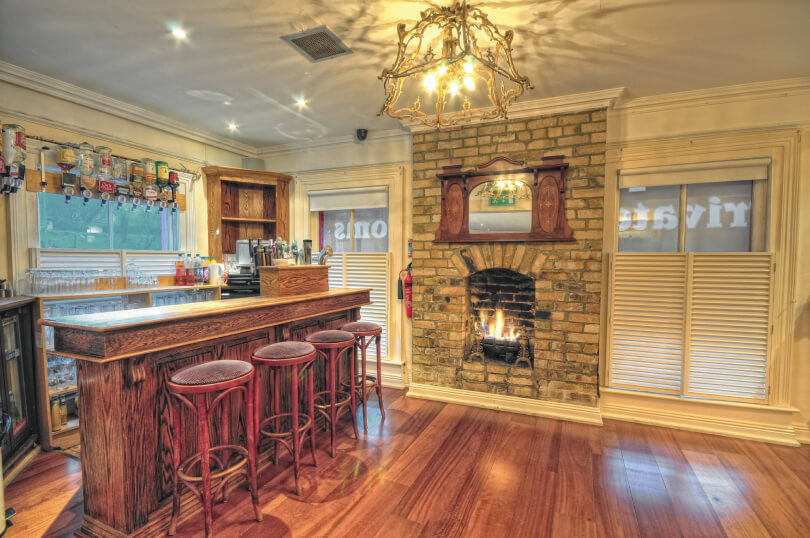
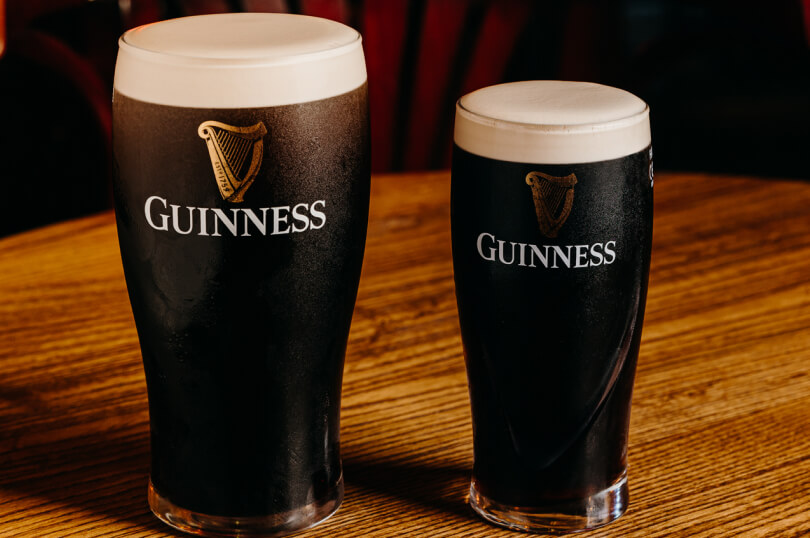
History of The Dropping Well
Long before The Dropping Well was established, Milltown was home to a thriving silk industry, two corn mills, an iron mill, a paper mill and a sawmill which was located at Classon’s Bridge on the site of the Dropping Well pub. In the late 18th Century John Classon started his own milling business at this site beside the river Dodder, he later built a bridge across the river from granite stone lifted from the Dodder bed to aid transport to and from his business, Classon’s Bridge still bears his name to this day.
Since first licensed in 1847 the Dropping Well has enjoyed eight ownerships:
Mr & Mrs John Howe, Miss Williams, Joseph Brownrigg, John Maher, Edward Daly, P.H. Meagher, The Cleary Family and the current owner Charlie Chawke, we know some of this great establishment’s history…
The Great Famine & The Dropping Well
The Dropping Well, one of Dublin’s most historic pubs owes its origins to the Great Famine of 1845 – 1849 and was first licensed as a Community Morgue in ‘Black ’47’. The Great Famine, having ravaged the countryside since 1845 reached epidemic proportions in Dublin by the early summer in 1847. Dublin was then a city beleaguered by dysentery, typhus, dropsy and fever as huddled, swarming masses of emaciated looking creatures left a ghostly type trail across the land. Many were Dublin people themselves while others arrived from the rest of the country in search of food, employment and shelter, with the ultimate objective of seeking passage away from Ireland as famine emigrants across the Atlantic Ocean to the New World.
The greatest tragedy of these starving masses lay not in the shortage of food as hundreds of tons of corn and other food products left Irish ports each day, but in the hopeless destitution of a people who could not help themselves
The First Owners of The Well
Each day in 1847 starving people communed along the banks of the Dodder River with many falling and perishing by its waterside. The presence of decaying and disease ridden bodies became a great problem for the authorities who needed somewhere to keep the bodies of these unfortunate souls with the hope of trying to identify them before they were buried in mass famine graves.
John Howe and his wife approached the authorities applying for a liquor license and offered to set up a Community Morgue station on the banks of the Dodder River at Classon’s Bridge. Their request was immediately granted and The Dropping Well Pub opened its doors to the public in July of 1847. However, the normal business of a public house was farthest from John Howe’s mind as his chief concern lay in dealing with the hundreds of ghostly type creatures who drifted down the Dodder Valley. In the cause of helping the afflicted, John Howe himself became contaminated and, despite the presence of medical attention died of complications in 1850. His wife continued the family business for a time before passing the premises on to a relative, Miss Williams, in 1855.
At the turn of the century, and with the morgue long gone, P.H. Meagher bought the premises. P.H. Meagher was one of the most charismatic publicans to ever enter the annals of the Dublin licensed trade. Having acquired the premises in 1908, he completed a lavish post-Victorian renovation which significantly upgraded the premises. P.H. was a strict publican who possessed an incredible passion of sport: racing, football and most especially boxing. Having boxed for a time in his younger days he took it upon himself to create a new attraction within the pub, a specially erected boxing ring. It is rumoured that for P.H., nicknamed PH ‘Boxer’ Meagher would ‘take on’ any aspiring pugilist who wanted a fight, giving them a welcome, however short, in his boxing ring. Historical accuracy is unclear but these events are responsible for creating much local myth and legend and more importantly, for establishing probably the most orderly pub in Dublin!
Today the ‘Boxer’ is commemorated in the stylish traditional bar at the Dropping Well which Charlie Chawke named in his honour.
Holy Hour and The Dropping Well
It was 1926 – the infant days of the Irish Free State. The scene was the Dropping Well Pub in Milltown – one of the most stylish, refined and sought after public houses in South Dublin. One would travel here in comfort by means of the Dartry Tram, enjoy your potion and savour the panoramic vista provided by the enveloping arms of Dublin’s green rolling hills, while listening to the melodious river sounds along the Dodder Falls.
O’Higgins and Civil War Emotions:
These were the prevailing conditions which Kevin O’Higgins, Minister of Justice and Home Affairs in the early Cumann na nGaedheal Governments, would have found here when he travelled by tram from his offices in Dublin City.
O’Higgins was sometimes accompanied by his bodyguard and on such occasions travelled by state car. He needed protection more then any other member of the Government because as Minister of Justice he had been responsible for giving greater powers to the Army which resulted in the execution of 77 leading Republicans since the Civil War. Conversely he was the most loved and hated man in the Irish Government. On the Free State side he was seen as a dedicated, efficient Minister whose sharpness of intellect and intolerance of indecisiveness made him the obvious long term successor to Michael Collins. On the Republican side he was the most despised figure in Irish political life, a ruthless traitor who had turned the gun on his one time friends and acquiesced in the execution of Rory O’Connor, best man at his own wedding.
Often drinking alone, and sometimes working late, O’Higgins could not help noticing workers of the local mills who, having received their wages about midday on Saturday, made the Dropping Well their first stop on the journey home. As the afternoon wore on and conviviality blossomed into bonds of imbibing friendships, the laughter grew louder and thoughts of returning home to their loved ones were conveniently placed on the back burner. One for the road became four or five and when eventually, on the proprietor’s firm words of encouragement, they rose to leave it was evident that much of the week’s hard earned labour was resting in the tills of P.H. Meagher. O’Higgins was appalled at this, particularly as he himself regretted the sacrifices of time which he had to inflict on his young wife and family.
Intoxicating Liquor Act
Always a man of action, O’Higgins saw the answer within the brief which he held as Minister for Justice. For several months civil servants had been working on the draft of the Intoxicating Liquor Act which was soon to come before the Dail for final ratification. He insisted on a provision in the Act that would ensure mandatory closing of public houses between 2.30 and 3.30pm each day.
‘Holy Hour’ enters Statute Books
Some months later in 1926 the Intoxicating Liquor Act came before the house and was passed into law accompanied by the provision of mandatory closing of public houses between 2.30 and 3.30pm each day. In a very short time this piece of legislation entered the rich culture of Irish pub lore as the ‘Holy Hour’ caused more infringements of the law than any other piece of legislation ever placed on the Irish statue books. Never a regimental nation of law abiders, this was the one piece of legislation which was broken gave us a certain internal stirring of pride. Equally it was the stuff of legend and fantasy which gave much inspiration and ready copy to Irish writers over the decades. When it eventually disappeared from the statue books in 1988 it left a definite cultural vacuum in Dublin “Publore”.
While the Holy Hour remained in force for 61 years it instigator Kevin O’Higgins was not so fortunate. He was assassinated on his way to Mass in Cooperstown on Sunday 10th July 1927 by an unofficial splinter group of the IRA. Though the Civil War was now finished for some four years, historians regarded his death as the final salvo of the saddest and most tragic episode in the nation’s history.
Chawke Pub
Group
A leader in the Hospitality Industry, the Chawke Group was established in 1959 and comprises of nine pubs and restaurants, three pizzerias, and two coffee shops across Dublin and Limerick.
